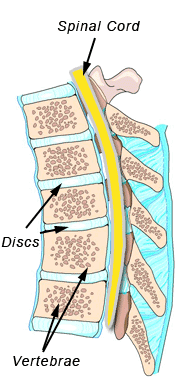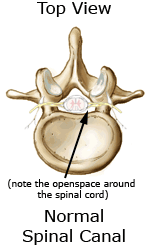Medical Library
Pick a Body Area
Other Choices
Sock ManagementLumbar Stenosis

Spinal stenosis is the narrowing of the spinal canals. It may involve the central canal, the hollow tube on the backside of the spine through which the spinal cord travels, and/or the transverse foramina, the canals from which the spinal nerves exit.
Narrowing of the spinal canals is usually an age related process (called secondary stenosis). During this process the vertebral discs lose their height (degenerate), the ligaments become stiff, and bone spurs may form. The combination of loss of disc height, hardening of the ligaments, and bone spur formation can cause the stenosis. Other conditions such as spondylolisthesis, trauma, or post-surgical complications, can also cause stenosis.
Because of mechanical compression and blood flow congestion, spinal stenosis can result in severe pain. With lumbar or low back spinal stenosis, symptoms often include low back pain and a diffuse radiation of pain into the buttocks and thighs. Tingling and numbness and leg weakness may be present as well.
Symptoms are often worse with standing, walking, and backward bending/extension of the spine. Sitting, forward bending, and unweighting of the body often provide relief. One of the hallmark signs of lumbar spinal stenosis is a decreased walking tolerance.

Conservative care (rehabilitation), may be helpful. Treatment may consist of stretching, strengthening, joint mobilization/manipulation, aerobic exercise, and activity modification. Walking with an "unweighting system" or aquatic exercise may be helpful.
It is important to work closely with your physician and physical therapist.
Possible Treatments
- Aerobic/Endurance Exercise Video
- Core Strengthening Video
- Gait or Walking Training Video
- Low Back Active Range of Motion Video
- Low Back Joint Mobilization Video
- Low Back Passive Range of Motion Video
- Low Back Resistive Range of Motion Video
- Lumbar Traction Video
- Stationary Cycling Video
- Stretching/Flexibility Exercise Video
- Walking Training (called Gait Training)
- Aerobic/Endurance Exercise
Additional Resources
Disclaimer
The information in this medical library is intended for informational and educational purposes only and in no way should be taken to be the provision or practice of physical therapy, medical, or professional healthcare advice or services. The information should not be considered complete or exhaustive and should not be used for diagnostic or treatment purposes without first consulting with your physical therapist, occupational therapist, physician or other healthcare provider. The owners of this website accept no responsibility for the misuse of information contained within this website.
